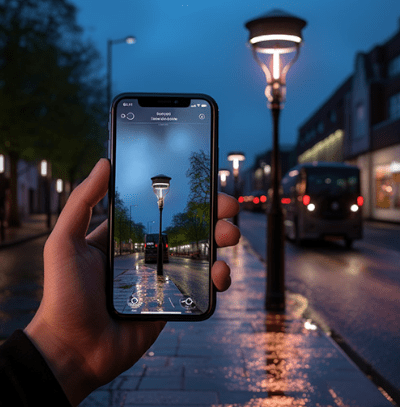Six areas across the UK will receive funding to trial a new multi-purpose smart street lamps that house EV charging hubs and boost wireless coverage including 5G.

Funding
As part of The Department for Science, Innovation and Technology (DSIT’s) Smart Infrastructure Pilots Programme (SIPP) to level-up digital connectivity, six councils will receive funding for the smart street lamps pilot. The funding for the £1.3 million pilot, which will run from October to 31 this year to March 2025 and is designed to test next-generation digital technologies, will range from £165,000 to £250,000 per council, with the local authorities expected to invest a further collective £2.7 million.
Why Smart Street Lamps?
The rising demand for wireless services, the need to speed up the rollout of 5G and free public Wi-Fi to enable the UK to catch up with other countries, together with the need to dramatically expand the EV charging network to overcome battery limitations and boost EV purchases have led to many different ideas being explored. Examples of options considered by companies include the installation of infrastructure on lamp posts, traffic lights, CCTV columns, benches, bins, and bus stops because they are already sited in large numbers across the UK and are particularly prevalent in towns and city areas.
The Benefits
In addition to boosting connectivity, the infrastructure installed on streetlamps as part of the pilot scheme can be adapted to carry out a range of functions, e.g. from charging EVs to monitoring air quality, and from displaying public information to saving energy with street lighting. The benefits include:
– As the Minister for Data and Digital Infrastructure Sir John Whittingdale points out: “digital connectivity – and a world-class wireless infrastructure will be the foundation for the jobs, skills, and services of the future.”
– The ability to adapt the smart infrastructure to carry out a range of functions could enable councils and combined authorities to unlock new opportunities and improve public services, e.g. from rolling out electric vehicle chargers to boosting business growth and helping keep streets safe.
– Being able to charge EVs from streetlights could provide confidence in the charging infrastructure (overcoming “range anxiety”) that could help boost EV sales in the UK. However, Rishi Sunak’s recent announcement that the government would push back the ban on new fossil fuel vehicles from 2030 until 2035 has been criticised for the possible negative impact it could have on EV infrastructure investment and EV sales.
What Does This Mean For Your Business?
The UK is lagging behind in terms of 5G and the availability of free public Wi-Fi, much to the frustration of UK businesses. Also, EV sales aren’t living up to expectations, partly because of the lack of a charging infrastructure of an adequate scale. In addition to these challenges the government is aware that a better wireless infrastructure could boost the economy, jobs, skills, and services, and although extended, the target date for a ban on new fossil fuel vehicles (2035) still seems very close.
All these challenges have put pressure on the government to try new ideas and come up with some fast solutions that won’t cost the earth. Adding connectivity infrastructure as an adjustable bolt-on to existing, widely available architecture like lamp posts, traffic lights, CCTV columns, benches, bins, and bus stops, could therefore be a way to tackle all these challenges at once. Clearly, it’s worth the investment to find out, and each of the six local authorities (which are also investing) are, no doubt, also hoping that this idea may offer them an innovative way to improve their public services and create new opportunities. If the pilot is successful, and once the new connectivity infrastructure is added to lampposts (which would be a major project in itself), businesses may start to feel the economic benefits, the economy could see a vital boost, and the EV industry could also start to grow more quickly.
By Mike Knight
